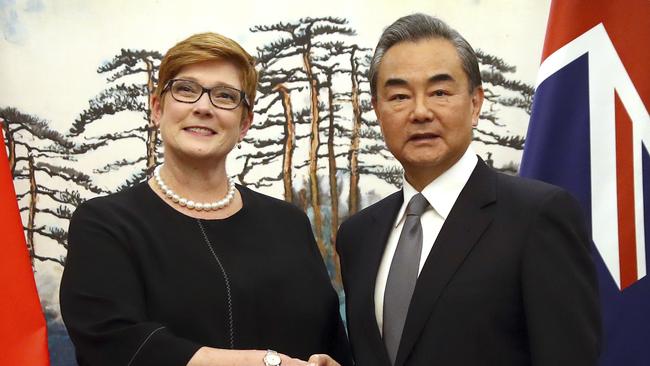Payne’s great leap forward for Australian ties with China
After more than two years of strain and Julie Bishop’s frosty reception, Australia-China relations took a huge leap this week.

After more than two years of strain, Australia-China relations have taken a huge leap forward this week with visits by Foreign Minister Payne and Trade Minister Simon Birmingham, as well as a contingent of business leaders, Queensland Premier Annastacia Palaszczuk and the Queensland Ballet.
The week has seen the first visit by an Australian foreign minister since Julie Bishop’s frosty reception in Beijing in February 2016, and the first official visit by a trade minister to China since the former minister Steve Ciobo was in Beijing in September last year.
The events coincided with a big showing by Australian companies at China’s first big import expo in Shanghai.
On Thursday morning Senator Payne met her Chinese counterpart Wang Yi at the Diaoyutai guesthouse, held a series of meetings and then, in the evening, launched the hardcover version of 45 years, 45 stories produced by the Department of Foreign Affairs and Trade to mark 45 years of Australia-China relations.
Last night in Shanghai, the Queensland Ballet opened the first night of its four-city China tour with Liam Scarlett’s production of a Midsummer Night’s Dream under the artistic direction of Li Cunxin, famous for his autobiography Mao’s Last Dancer.
After many ups and down in the relationship, to use the words of Mr Wang, the Australia-China relationship is looking a lot better than it has for some time.
Now three months into the job of Foreign Minister, a confident Senator Payne made repeated comments during her one-day visit to the Chinese capital about the warmth of her welcome — important words in a relationship that has been frosty for some time.
In her preliminary comments as the Australians faced the Chinese across a long table at the start of the talks, Senator Payne recounted going to China as a staffer with a former NSW premier 25 years ago as Australian were beginning to see the opportunities in the China market.
When she praised the Shanghai expo, an initiative of Chinese President Xi Jinping, Mr Wang’s normally stern face lit up.
Australia has realised it needs to take a more diplomatic approach to its dealings with China, but it can do so at the same time as making decisions China might not like.
And China has recognised that in a more security conscious, fractious Trump-led new world order, that the relationship can withstand some decisions that it really doesn’t like, including the ban on Huawei from supplying Australia’s next-generation 5G network.
Senator Payne and Mr Wang’s more than two hours of talks came after the news Canberra was considering blocking a bid by the Hong Kong-based CKI for pipeline company APA — which some observers initially took as another anti-China move.
But by careful wording of the announcement, Senator Payne was able to explain that it was because one foreign investor was already seen as having significant ownership of critical infrastructure in Australia and not a measure aimed at any one country.
Listening to her explanation, Mr Wang indicated the relationship would not be affected by “one decision”.
That said, there are many potential stresses in the relationship, including China’s role in the South China Sea and the Pacific Islands as well as its mass “re-education camps” of Uighur Muslims in the Xinjiang region.
Chen Hong, director of the Australian Studies Centre at Shanghai Normal University, described the meeting as a “concrete step to bring the standstill of bilateral relations out of the freeze”.
“Both sides have shown their willingness to improve the relationship which is very important to both Australia and China in this time of uncertainties,” he told The Weekend Australian yesterday.
He was critical of the decision to block the CKI bid for APA as a “new barrier on the path of the improvement of the relationship”.
Yet to be outlined in any detail is the one agreement which appeared to be reached on both sides about working together in the Pacific islands. Senator Payne said later it could involve health and education initiatives. While her ideas were not very specific, the fact that both sides are looking for joint aid and humanitarian work in the Pacific Islands could go some way to help to diffuse tensions over that region.
The next step is a visit to China by Prime Minister Scott Morrison which could be on the cards before the end of the year. It is not a certainty but what is certain is that relations between Australia and it biggest trading partner have reached a pragmatic new and potentially workable accommodation for the simple reason that both sides have recognised it is in their best interests to do so.



